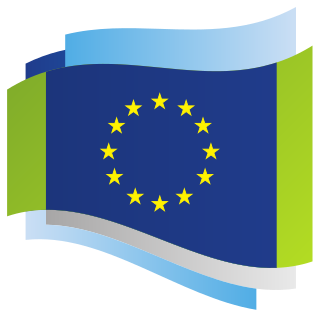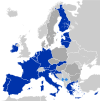
COREPER, from French Comité des représentants permanents, is the Committee of Permanent Representatives in the European Union, made up of the head or deputy head of mission from the EU member states in Brussels.

The European Defence Agency (EDA) is an agency of the European Union (EU) that promotes and facilitates integration between member states within the EU's Common Security and Defence Policy (CSDP). The EDA is headed by the High Representative (HR/VP), and reports to the Council. The EDA was established on 12 July 2004 and is based in Brussels, Belgium.
Flexicurity is a welfare state model with a pro-active labour market policy. The term was first coined by the social democratic Prime Minister of Denmark Poul Nyrup Rasmussen in the 1990s.

The European Research Area (ERA) is a system of scientific research programs integrating the scientific resources of the European Union (EU). Since its inception in 2000, the structure has been concentrated on multinational cooperation in the fields of medical, environmental, industrial, and socioeconomic research. The ERA can be likened to a research and innovation equivalent of the European "common market" for goods and services. Its purpose is to increase the competitiveness of European research institutions by bringing them together and encouraging a more inclusive way of work, similar to what already exists among institutions in North America and Japan. Increased mobility of knowledge workers and deepened multilateral cooperation among research institutions among the member states of the European Union are central goals of the ERA.
The Framework Programmes for Research and Technological Development, also called Framework Programmes or abbreviated FP1 to FP7 with "FP8" being named "Horizon 2020", are funding programmes created by the European Union/European Commission to support and foster research in the European Research Area (ERA). The specific objectives and actions vary between funding periods. In FP6 and FP7 focus was still in technological research, in Horizon 2020 the focus is in innovation, delivering economic growth faster and delivering solutions to end users that are often governmental agencies.

Although the European Union has legislated in the area of energy policy for many years, the concept of introducing a mandatory and comprehensive European Union energy policy was only approved at the meeting of the informal European Council on 27 October 2005 at Hampton Court. The EU Treaty of Lisbon of 2007 legally includes solidarity in matters of energy supply and changes to the energy policy within the EU. Prior to the Treaty of Lisbon, EU energy legislation has been based on the EU authority in the area of the common market and environment. However, in practice many policy competencies in relation to energy remain at national member state level, and progress in policy at European level requires voluntary cooperation by members states.

The Commissioner for Internal Market and Services is a member of the European Commission. The post is currently held by Commissioner Elżbieta Bieńkowska.

The Commissioner for Industry and Entrepreneurship is a Vice-President of the European Commission. The current commissioner is Jyrki Katainen.
The Capital Requirements Directives (CRD) for the financial services industry have introduced a supervisory framework in the European Union which reflects the Basel II and Basel III rules on capital measurement and capital standards.

The Economic and Financial Affairs Council (ECOFIN) is one of the oldest configurations of the Council of the European Union and is composed of the economics and finance ministers of the 28 European Union member states, as well as Budget Ministers when budgetary issues are discussed.
The Enterprise Europe Network provides support for Small and Medium-sized Enterprises (SMEs) with international ambitions. Co-funded by the European Union's COSME and Horizon 2020 programmes, the Network's aim is to help businesses innovate and grow internationally.
Directive on intra-EU-transfers of defence-related products is a European Union Directive with relevance for the European Economic Area. It is also known as the "ICT-Directive".
Established in 1987, the EU-Japan Centre for Industrial Cooperation is a unique venture between the European Commission and the Japanese Government (METI).

Franck Proust is a French politician of the Union for a Popular Movement and member of the European Parliament since 2011, first vice-chair of the French EPP Group delegation in the European Parliament. He is first deputy mayor of Nîmes. Being originally an entrepreneur, he is also an insurance agent in Nîmes.

The Employment, Social Policy, Health and Consumer Affairs Council (EPSCO) is a configuration of the Council of the European Union. It meets four times a year, with two of the meetings focusing on social policy and employment. It is composed of the employment, social affairs, health and consumer policy ministers from all EU member states.

The Transport, Telecommunications and Energy Council (TTE) is a configuration of the Council of the European Union made up of transport, energy and telecommunications ministers. The number of meetings per year and its composition depends on the agenda:
Horizon is an online-only, open-access magazine covering research and innovation, published in Brussels since 2013 by the European Commission. It covers a wide range of topics, including agriculture, energy, environment, frontier research, health, ICT, industry, policy, science in society, security, social sciences, space and transport.

The Economic and Financial Committee (EFC) is a European Union advisory body, defined by the article 134 of the Treaty on the Functioning of the European Union. In 2012 Thomas Wieser because the committee's President, he is simultaneously the President of Eurogroup Working Group. Vincenzo La Via became Vice-President in July 2015.

The sugar industry subsumes the production, processing and marketing of sugars. Globally, most sugar is extracted from sugar cane and sugar beet.









